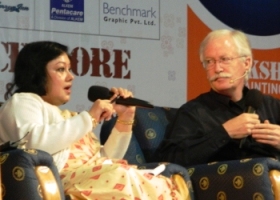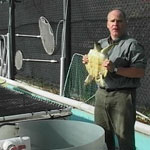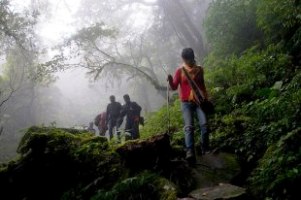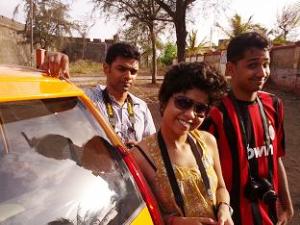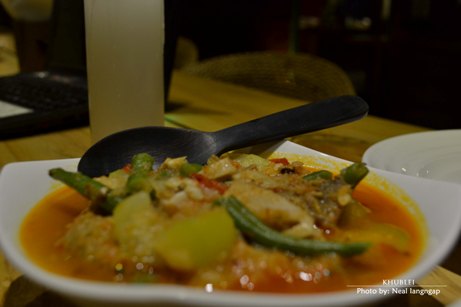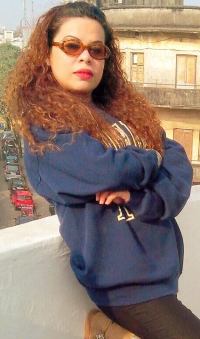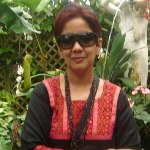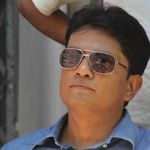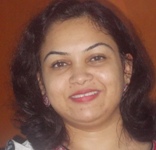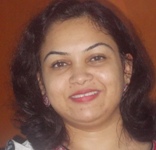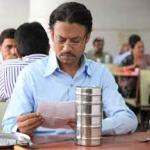The CALM 2013 festival, held in Shillong this year from May 9 to 11, had an excellent mix of programmes, ranging from book releases to Photography and Art workshops, from discussions to debates, from talks to conversations. These latter, especially, were very interesting events where two or at most three individuals discussed their lives and works in free flowing, unstructured talks that were engrossing. Often, the audience joined in with comments and questions, leading to more discussions.
The conversation between writers Steven Alter of Mussoorie and Mitra Phukan of Guwahati was held in the post lunch session on May 11. Steven is a writer of “quiet books” – his own term – while Mitra’s books, too, are, more often than not, similarly low pitched. The Mussoorie writer has 15 books to his credit so far, and has been writing since 1978. Both of them write both fiction and non fiction.
Mitra opened the session by asking about Stephen’s book, Elephas Maximus: A Portrait of the Indian Elephant, since it established a connect between him and this region. He revealed that during the course of his researches for this book, he had come to Majuli and to Kaziranga, for which he was all praise. Mitra carried the conversation forward by commenting that this book could easily also have been positioned as fiction, with a plot and characters. She asked him how he decided whether a book would be fiction, or non fiction.
With his usual disarming candour, Steven revealed that non fiction was easier to sell to publishers. Based on an outline and a few chapters, it was possible to get an advance, from which one could work on the book. This lead to the question about whether he preferred Indian publishers to American and British ones, or vice versa. He has, after all, been published in several countries. Stephen replied that they were all different, but more than nationality, it was the times that had changed. Painting a charming picture of the kind of “editorial meetings” that had taken place in the past, he described the fancy lunches - with afternoon drinks - of the past, and compared them to today’s hurried editorial discussions. He also described the changes in the mindsets of editors themselves. Previously, his editors would only suggest, changes, and that too, delicately. Today editors were much more “demanding”, in a way.
Steven wanted to know about Mitra’s writings, especially A Monsoon of Music whose title he said he found beautiful. She spoke for a few minutes about how this particular book too was a quiet one, since it deals with Shastriya Sangeet (classical music), and has a calm and unhurried pace. She said she was happy since many musicians, who don’t normally read much, had written in to say how much they appreciated this book, and the fact that it described their lives.
The authors then discussed their raw material, and where they found it. Steven spoke about his travel writings, and how he conducted his research. At this point, Mitra wanted to know about the “craft” of his writing, and how he went about it. He revealed that he wrote for about three hours every day, in as disciplined a way as he could, trying to average about eight hundred to a thousand words per day. He mentioned, too, that even if he could write a couple of hundred more, he did not. He liked to have that as “reserve” so that he could continue seamlessly the next day. He used the simile of carrying jerrycans of petrol to get the vehicle of his writing moving. A thousand words or so was three pages. So…three jerrycans of petrol to get it moving!
This metaphor seemed to resonate with Mitra, who revealed that she too wrote about a thousand to twelve hundred words a day. She thought of it as taking out three bucketfuls of water from a well every day. Not more, even if she had the ideas for it, so that she could continue the next day, and at least a couple of hundred words would be taken care of. The hope was that the well would fill up to its former level overnight, with ideas and images.
Mitra then asked about a traumatic part of the Mussoorie author’s life, when he and his wife Ameeta had been violently attacked by robbers in his own house, and left for dead. She mentioned that she had been moved by what he had written later about it…”Retelling a story can be a form of healing too, as each rendition attempts to make sense of disturbing events.” She made a parallel connection between his words, and the upsurge of writing in the region of India’s Northeast about the conflicts that are endemic now to seven of the eight states.
Steven gave a thoughtful and considered reply to this. He said that even as he lay on the operating table, about to be operated on, his mind kept thinking of the way he would put that moment, that experience, into words, into a story, into a “telling” of some kind. This, he mentioned with his characteristic wry smile, would be a kind of “Revenge of the Writer”. As he healed, he “told” the story in many ways – to doctors, to the police, to friends, to wellwishers, to reporters. Each telling was in some subtle way, different from the preceding ones. He is still “telling” it, and is still “fashioning” it, in a way.
Mitra then wanted to know about the Mussoorie Group of Writers, and spoke also about the North East Writers’ Forum. This latter body, she revealed, has as its members across all eight states of the region, writers who work primarily in English. These members, senior as well as newer members, find encouragement and inspiration in the words and works of each other as they meet regularly in different geographical locations across the region. The Forum is a formal, registered body, though its meetings have informality as its keynote.
Steven responded that theirs was not a formal grouping at all, but a much looser body, which mostly operated from his own office, with him driving it forward. They did meet on an informal basis quite frequently, deciding on festivals, who to invite, and so on.
There were, after this, several questions from the audience. One of them was from a gentleman who wished to know from both the authors about how they went around creating characters. Steven said that for him characters were one of the most important parts of a work of fiction. He did not use long descriptive passages to place them before the reader, but worked them in during the course of the story. Mitra too said that characters for her were a very important aspect of the story, and she used them to take the story forward. She too avoided long descriptions, she revealed. Another gentleman wanted to know the Raag on which A Monsoon of Music was based. The author replied that it was a mix of monsoon Raags, Malhars and Des and so on, and that the whole story was structured like a kheyal, with alaap and vilambit and drut.
The session ended on a note of warm camaraderie between the authors and the audience.
Find us on facebook: facebook.com/TheThumbPrintMag
